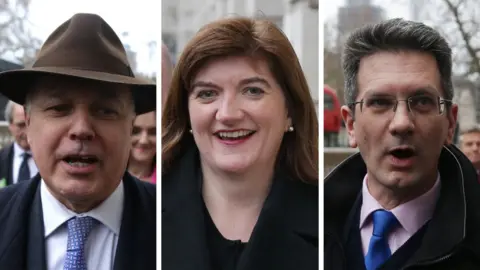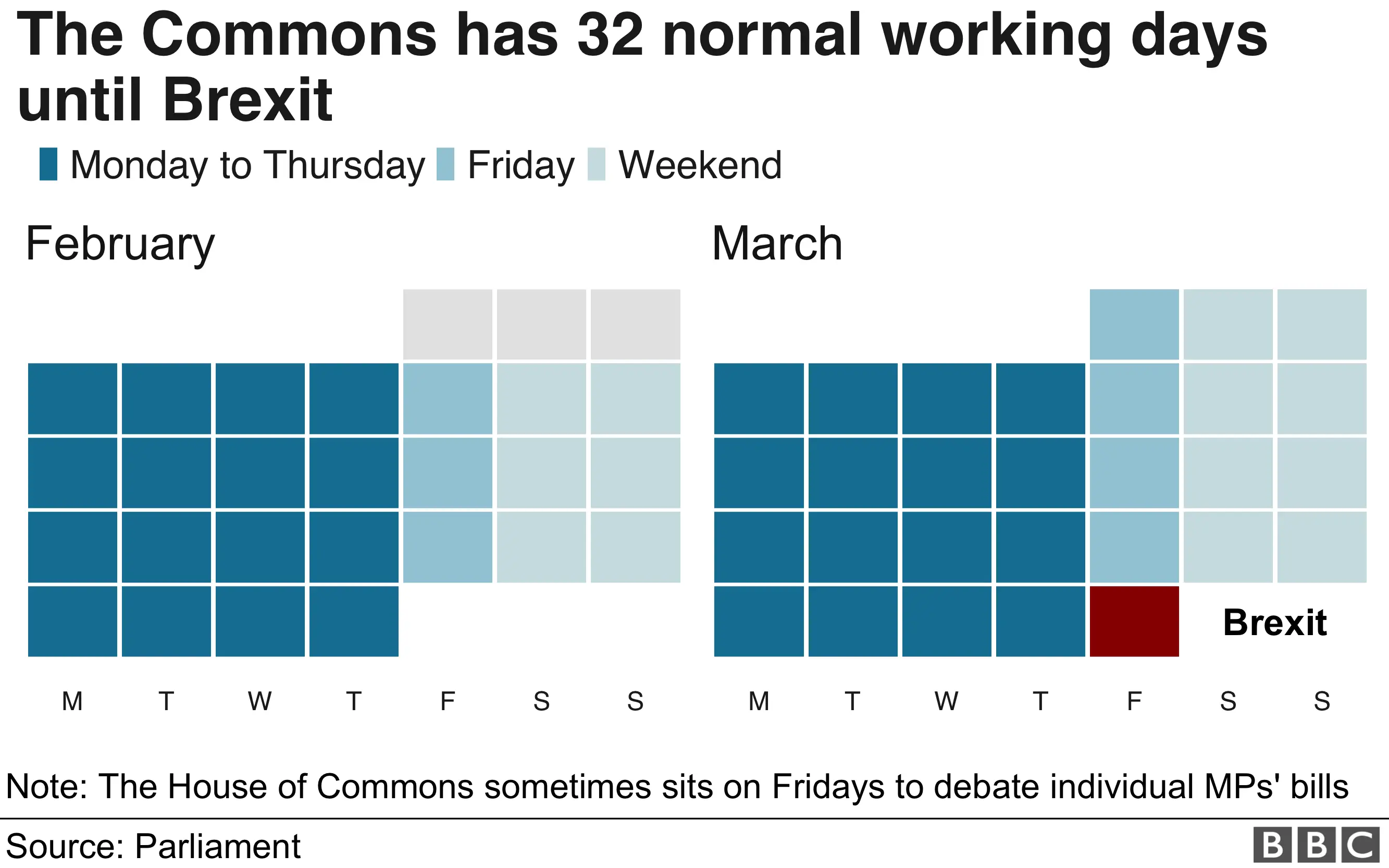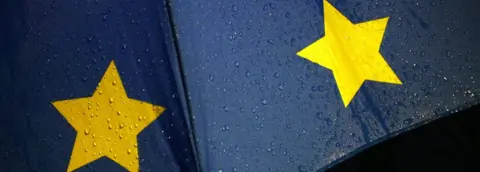Brexit: Talks on backstop 'alternative arrangements' begin
 AFP
AFPTory MPs have met the government to discuss alternative arrangements to the proposed Irish border "backstop", as three days of talks begin.
The Alternative Arrangements Working Group, with Leave and Remain MPs, met for the first time after the Commons voted to find another way of avoiding the return of Irish border checks.
A government spokesman said the talks had been "detailed and constructive".
But EU leaders have continued to rule out making changes to the backstop.
The Irish PM Leo Varadkar told RTE radio the UK was reviewing ideas that had "already been rejected", and it was "very frustrating" that the UK government was "going back to the idea of technology".
But German Chancellor Angela Merkel said the EU would listen to proposals to solve the Irish border "riddle", although they needed to hear how the UK wanted to do it.
The backstop is an insurance policy designed to avoid a hard border "under all circumstances" between Northern Ireland and the Irish Republic after Brexit.
What is the working group?
Number 10 said the working group of Conservative MPs was set up following "significant support" for the so-called "Malthouse Compromise" - named after housing minister Kit Malthouse who encouraged talks between different groups of MPs.
Engineered by both Leavers and Remainers, the proposal includes extending the transition period for a year until the end of 2021 and protecting EU citizens' rights, instead of using the backstop.
Members of the working group include Conservative MPs Steve Baker, Marcus Fysh, Owen Paterson, Damian Green and Nicky Morgan.
The group will hold regular meetings with Brexit Secretary Stephen Barclay, as well as senior government officials from HMRC, Cabinet Office Europe Unit and Number 10.
Mr Fysh said the group had spoken to the EU and it was "very open" to the proposals, adding that they were not based on new technology.
A Department for Exiting the European Union spokesman said the group had explored the proposal "in detail" on the first day of talks.
The BBC's political correspondent Chris Mason said the government's willingness to provide civil service support to this group of Conservative MPs was an indication of how seriously Downing Street was treating their idea.
Why do MPs want to change the backstop?
The backstop insurance policy would kick in if, after almost two years after Brexit, the two sides had not reached a trade agreement with one another that avoided the need for physical border checks.
It would keep the UK in a "single customs territory" with the EU and leave Northern Ireland effectively in the EU's single market for goods.
Critics fear the UK could be "trapped" in this arrangement for years, leaving it unable to strike its own trade deals on goods with the rest of the world.
Unionists also fear it would drive a wedge between Northern Ireland and the rest of the UK. But by changing the backstop, the PM could win support.
Ex-Northern Ireland first minister Lord Trimble has said he is planning to take the government to court over the Brexit deal, claiming the Northern Ireland protocol - which includes the backstop - breaches the terms of the Good Friday Agreement.
Mrs May will visit Northern Ireland on Tuesday to deliver a speech on Brexit and meet business leaders.
What 'alternative arrangements' are there to the backstop?
Alternatives to the backstop that the prime minister has said she wants to discuss with EU leaders include:
- a "trusted trader" scheme to avoid physical checks on goods flowing through the border
- "mutual recognition" of rules with the EU
- "technological" solutions
Mr Javid told the BBC's Andrew Marr Show that an alternative arrangement to the Irish backstop "can be done" using "existing technology".
He said the attorney general was "leading on another strand of work" - looking at whether a "hard time limit or proper exit mechanism" was possible.
Is there enough time to change the backstop?
The UK is due to leave the EU at 23:00 GMT on Friday 29 March, when the two-year time limit on withdrawal negotiations enforced by the Article 50 process expires.
Theresa May has said she is "determined" to deliver Brexit on time, but a number of cabinet ministers have indicated they would be willing to agree to a short extension to finalise legislation for Brexit.
However, a plan to delay Brexit for up to nine months to prevent a no deal - put forward by Labour MP Yvette Cooper - was voted down by Parliament.
Labour's shadow Brexit secretary Kier Starmer said he could not see Mrs May negotiating an alternative to the backstop at this late stage, saying the prime minister had effectively "run down the clock".
Meanwhile, Scotland's First Minister Nicola Sturgeon said contingency plans for Britain's departure from the EU with no deal were "genuinely astonishing", in a speech in the US.
She warned of food shortages and stockpiling of medicine amid a "real and growing risk" of a no deal scenario.

How has the EU responded?
Numerous politicians have shut down the idea of looking at the backstop again, saying there was no desire to re-open negotiations on the withdrawal agreement in Brussels.
The BBC's Brussels reporter Adam Fleming said the EU was not looking for a substitute solution, because they say they've already investigated every other option that exists and none has the same effect as the backstop.
The EU's chief negotiator, Michel Barnier, said there was "full agreement" that the withdrawal agreement "cannot be reopened".
Allow X content?

Irish Deputy Prime Minister Simon Coveney said the withdrawal agreement rejected by MPs already allowed the EU and UK to work on alternative arrangements for the backstop.
He added: "What Ireland is being asked to do by some in Westminster is to essentially do away with an agreed solution between the UK government and EU negotiators and to replace it with wishful thinking and I think that's a very unreasonable request to ask the Irish government to be flexible on."
Speaking during a trip to Japan, German Chancellor Mrs Merkel said: "To solve this riddle, you have to be creative and you have to listen to one another.
"We can have those conversations... But we must hear from Great Britain how they want to do it."
Labour's Hilary Benn met the Secretary General of the European Commission, Martin Selmayr, in Brussels.
Speaking after Monday's meeting, Mr Benn - who chairs the Brexit select committee - said the EU would be prepared to consider an additional legal protocol to the withdrawal agreement if they were convinced it would help a deal get through Parliament.
But Mr Selmayr later tweeted that when asked if such an assurance would help, the response from MPs was "inconclusive".
He added: "The meeting confirmed that the EU did well to start its no deal preparations in December 2017."
Leave supporter and Tory MP Andrea Jenkyns - who was also at the meeting - tweeted afterwards that Mr Selmayr revealed the EU had not been asked to remove the backstop or re-open negotiations by the British government.
Allow X content?


EU digs heels in over Brexit deal
By Katya Adler, BBC Europe editor
 Reuters
ReutersSo. how open does the EU seem almost a week on from parliament narrowly voting in favour of an amendment to find alternatives to the backstop guarantee to keep the Irish border open after Brexit?
After all, with every passing day as we've heard, again and again and again, the clock is ticking towards an increased chance of a no-deal Brexit with all the costs and chaos that could involve.
Well, if I were to speak in weather forecast terms, I might describe current EU attitudes as frosty with a chance of ice.
If Theresa May comes to Brussels later this week, she will be received politely and listened to attentively.
But if her EU ask remains centred around getting a time limit to, or allowing the UK a unilateral get-out mechanism from, the Irish border backstop or if she pushes again for pure technology as a means of avoiding a hard border on the island of Ireland, then the likelihood of her being sent home empty-handed - or as good as - is very high indeed.
